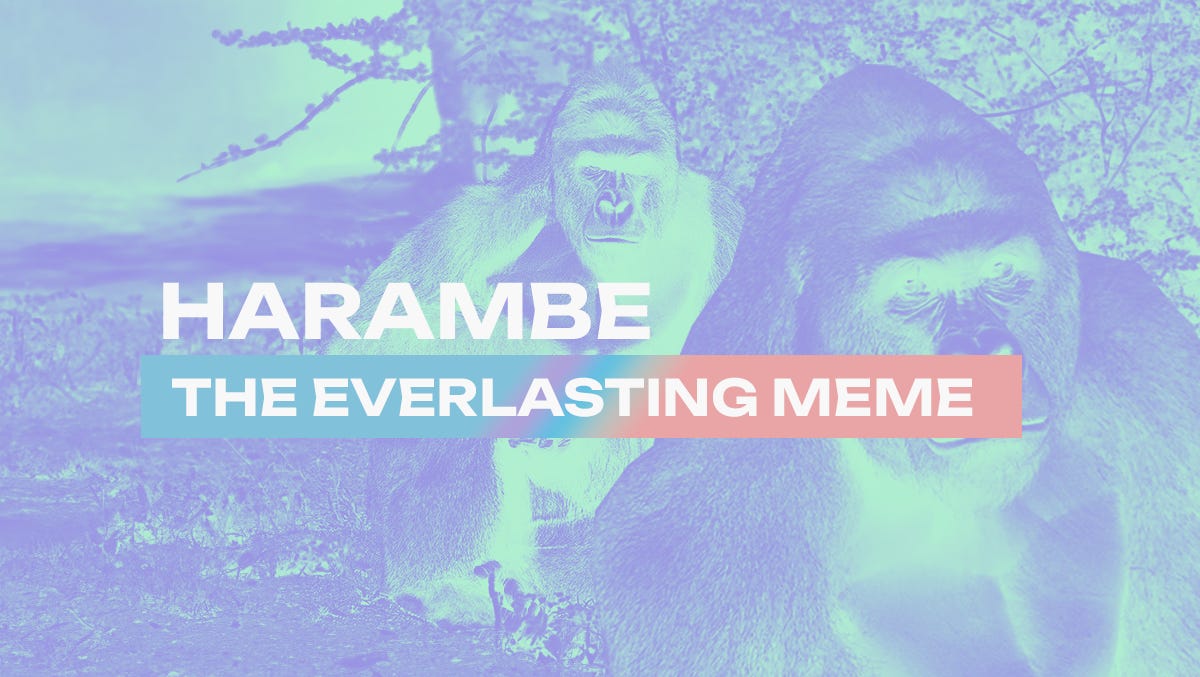Why Harambe became the everlasting Meme
A rebel's cry "Dicks Out For Harambe" becomes the animus for 2016's and onward's internet populism
On July 1, 2015, a wealthy American dentist lured a lion out of the protection of the Hwange National Park and hunted him for sport. He was a famous lion, beloved by the people of Zimbabwe for his black mane, named Cecil the Lion.
The moment the news cycle took hold of the story, the public outcry was immediate. The dentist’s business was review-bombed, Zimbabwe’s authorities charged the poachers who assisted the hunter, celebrities from Ricky Gervais to Sharon Osbourne chimed in, and several nations and airlines clamped down on the transportation of hunting trophies.
But within a few weeks, the news cycle was over. It was time to move on.
In May 2016, a child falls into the zoo enclosure of Harambe, the gorilla. At first, he is just curious, but his behavior became more and more unpredictable. The zoo authorities had to make a decision — and they chose to kill him with a single rifle shot.
The news cycle was just as swift, turning tragedy into hours of commentary, but this time they failed to find a villain. Were the parents at fault? Anyone with children knows how fast they can get in trouble. Was it the zoo? If they had tranquilized Harambe, it could have taken several minutes to work, and in the meantime, Harambe could have become even more confused and dangerous. It was a tragedy without a clear hero or villain.
And then, the major news networks were ready to move on — but the internet wasn’t.
Towards the end of the news cycle, Harambe had at least achieved moderate memetic notoriety as another name on the growing list of celebrity deaths of 2016, but it was the absurd meme “Dicks out for Harambe” that launched Harambe into cultural immortality. Why? It had become a parody of a news media infrastructure turned outrage-as-business machine.
A great example of this is “Pharma Bro” Martin Shkreli on CBS News. The two anchors try their damnedest to confront him for joking about Harambe when the Cincinnati Zoo had asked the public to stop, but Shkreli responds by escalating the absurd morality politics by talking about his own experience testing pharmaceuticals on primates. He manipulates the same language around the issue in jest as a tool to poke at one of America’s largest and oldest news media institutions.
It is this anti-establishment ethos that propelled the meme behind Harambe, and is the same ethos that undergirds much of the internet’s memetic culture — from the post-ironic affection for Ted Kaczynski and Marvin Heemeyer, to the anti-Hedge-Fund rally behind GameStonks; from the idea that memes become cringe when corporations use them, to the idea that everything is a psyop; It’s the same ethos behind the Ron Paul years and the Sanders and Trump campaigns. These memes have staying power in-part because they take part in the grander tradition of the internet as a grassroots expression.
For more research, think-pieces, and research on memes and internet culture, subscribe to our newsletter.





